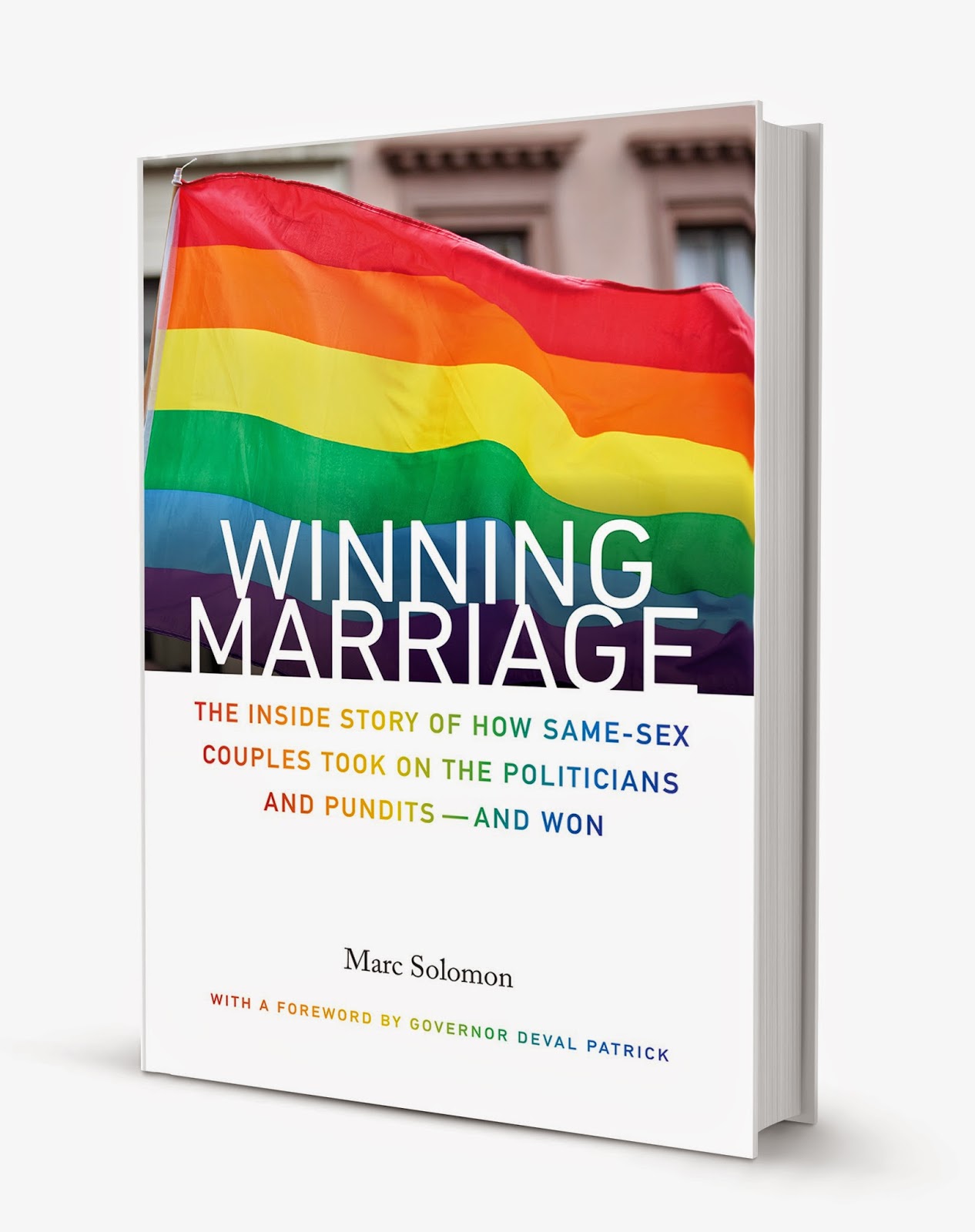by Tom Haushalter
UPNE Marketing Manager
“If I can sell gay marriage, I think I can sell a book.”
That was one of the first things Marc Solomon, author of Winning Marriage: The Inside Story of How Same-Sex Couples Took on the Politicians and Pundits—and Won, said to the UPNE sales and marketing team when we gathered for lunch in Boston several months before his book's November 2014 publication in our ForeEdge imprint. Although a debut author—of a chronicle of his life's work waging the then-unfinished legal battle for marriage equality in America—Marc came to lunch with questions about book promotion that seemed to be searching for parallels to the grueling public relations campaign he'd been directing (with Freedom to Marry) for years. In other words, this wasn't Marc's first time to the rodeo.
We were all keenly aware of the possibilities surrounding his book, as marriage equality had ascended to being the most important social movement of its time. The end of the Defense of Marriage Act (DOMA), struck down the year prior, made way for several states to begin allowing same-sex unions, and there was an air of inevitability that the Supreme Court would soon hear a case to decide, once and for all, if all Americans, in any state, were free to marry whomever they choose. We weren't worried about establishing a news hook.
But the many uncertainties baked into our plans for Winning Marriage—how soon will SCOTUS take action? And what if they make the wrong decision?—lent elements of surprise that don't accompany every book you get to publish. From that first lunch date through the hardcover's November release, through reviews and a sprawling national tour, through an historic decision and an uncannily timed paperback edition, this book and its tireless, magnificent author found ways to blow away everyone at UPNE. Here are the highlights of our continuous surprise:
They all approve this message
Authors can be fond of loading their blurb/endorsement wish lists with A-listers they’re not sure how to contact, any of whom would be great to have. Marc Solomon furnished us with a list of endorsers that included legendary journalist Bob Woodward, former U.S. congressman Barney Frank, Senator Tammy Baldwin, Wicked author Gregory Maguire, Facebook cofounder Chris Hughes, former White House press secretary Dee Dee Myers, Los Angeles mayor Eric Garcetti—to name a few! Our success rate on those blurbs was 100 percent. (Oh, and Massachusetts governor Deval Patrick wrote the foreword.)
A deluge of media
 |
| Marc takes his seat on NBC's Meet the Press. |
Where in the world isn't Marc Solomon?
As the national campaign director for Freedom to Marry, Marc was never one to sit back and watch the returns come in. True to his word, he sold his book like he sold gay marriage—not that the two weren’t one and the same! At some point, I’ll admit, I lost track of where in America Marc was on a given day, or where he’d be the next. From bookstore readings in Boston to house parties in Los Angeles to college classroom visits in Chicago and St. Louis, he spanned the country over the course of several months.
Countless people, from all walks of life, shared their own stories as part of this movement. Reflecting on the warm reception of his book, Marc says, “I especially loved hearing from younger people, in their 20s and early 30s, who weren’t necessarily paying attention to the early marriage battle in Massachusetts [in 2003], who didn’t realize how intense and focused the fight was even then.”
The Decision and the Revision
By now we all know how the story ends. On June 26, 2015, in a 5-4 decision, the Supreme Court ended the nationwide ban on same-sex marriages. Victory celebrations ensued. There was only one problem. The story, as told in Marc Solomon’s book, was incomplete. It needed the final chapter!
We were preparing for this, though. And Marc was probably the most adamant that the paperback edition of Winning Marriage, due out in early fall of 2015, be revised to include an afterword on the historic SCOTUS decision. I do not exaggerate when I say that on the day the decision was handed down, Marc began writing that last chapter. And he turned it in for editing a few days later—the deadline loomed that closely.
Now we can confidently say that the Winning Marriage paperback is the whole story.
“The playbook for progressive causes”
 |
| Marc Solomon with the amazing Freedom to Marry team |
As Winning Marriage becomes enshrined as not only the definitive story of the marriage equality movement in America, but as a guide for any movement to come (see these applicable lessons that Marc learned), Marc Solomon has himself moved on to the next chapter in his career, recently joining the team at Civitas Public Affairs Group, a firm that consults with an array of advocacy campaigns. I believe they know full well the indomitable force for good they’ve gained in Marc.
*
This post goes up in honor of University Press Week 2015 (Nov. 8-14), and today other fine UPs are sharing their favorite "surprises" from the past year. So follow the links to the press blogs below and keep reading!
University Press of Florida
University of Michigan Press
University Press of Mississippi
University Press of Kansas
University Press of Kentucky
University of Nebraska Press
University of California Press
#ReadUP #UPWeek











